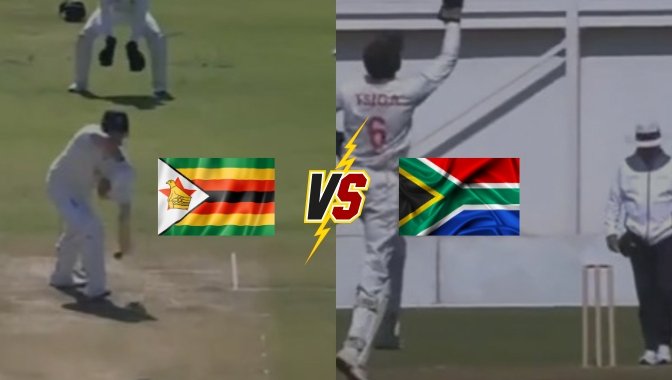The first Test between Zimbabwe and South Africa in Bulawayo had its fair share of drama, but one moment stood out in this no DRS match: a crucial umpiring decision that could not be reviewed. It ended up costing Zimbabwe dearly.
On Day 1 of the match, South Africa were struggling at 63 for 4. Debutant Lhuan-dre Pretorius appeared to edge a delivery from Zimbabwe pacer Tanaka Chivanga. The sound was clear. The Zimbabwean players appealed instantly, and keeper Tafadzwa Tsiga was confident the batter had nicked it. However, the umpire remained unmoved.
The problem? There was no Decision Review System (DRS) in place.
With no way to challenge the call, Zimbabwe had to accept the decision. Pretorius, who could have been dismissed early, went on to score a fifty on debut. He built a game-changing partnership with Dewald Brevis. That one missed opportunity allowed South Africa to regain control and build a stronger total. The momentum shifted away from the home side.
Also Read BBL Draft 2025–26 Sees Babar Azam and Pakistani Talent in High Demand
This incident once again highlights the gap between the facilities available in top-tier cricketing nations and those available to smaller teams like Zimbabwe. The absence of DRS not only affected the fairness of the match. It also exposed how uneven the playing field remains in international cricket.
DRS has become a standard tool in most Test matches around the world. It offers a safety net against human error. It gives teams a fair chance to challenge decisions that could change the course of a game. Unfortunately, in countries with limited resources, DRS is not always available. This is mainly due to the high cost of the technology and broadcasting requirements.
Zimbabwe, currently ranked 11th in the ICC Test rankings, are not part of the World Test Championship 2025–27 cycle. Their matches often lack the kind of global coverage and technological backing seen in bigger fixtures. As a result, moments like these—where technology could have corrected a crucial mistake—become painfully impactful.
For Zimbabwe, the incident was more than just a missed wicket. It was a reminder of the challenges smaller cricketing nations still face on the global stage.
As cricket continues to evolve, moments like this will hopefully push governing bodies to make review systems more accessible across all levels. Until then, teams like Zimbabwe will keep fighting hard. But sometimes, they must do so without the tools they truly deserve.











